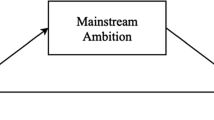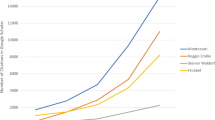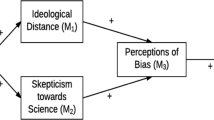Abstract
The assertion by Baer and Lambert (1990) that social science training does not promote radicalism, is tested in two studies. The first, using a sample of politically active students from Montréal (N=68) and measures of radical ideology and political convictions, shows social science students are over-represented among politically active students, and more likely to espouse radical ideology and label themselves members of groups aiming to restructure society, than students from other fields. The second study compares first and third-year social science students from Toronto (N=99) on measures of radical ideology, attitudes toward groups favouring change or the status quo, and causal attributions regarding poverty and unemployment. Results suggest social science training fosters positive evaluations of groups seeking change, espousal of radical ideology, tendency to fault the system for social problems, decrease in tendency to fault individuals, and development of a coherent ideological framework. Implications for academic socialization theories and methodological issues are discussed.
Similar content being viewed by others
References
Altemeyer, Bob (1988).Enemies of freedom: Understanding right-wing authoritarianism. San Francisco: Jossey Bass.
Baer, Douglas & Lambert, Ronald D (1990). Socialization into dominant vs. counter ideology among university-educated Canadians.Canadian Review of Sociology and Anthropology,27, 487–504.
Brym, Robert J. (1980).Intellectuals and politics. London: George Allen & Unwin.
Conover, Pamela J. & Feldman, Sidney (1981). The origins and meaning of Liberal/Conservative self-identifications.American Journal of Political Science,25, 617–645.
Converse, Phillip E. (1964). The nature of belief systems in mass publics. In D. E. Apter (Ed.),Ideology and discontent (pp. 206–261). New York: Free Press.
Feldman, Kenneth & Newcomb, Theodore M. (1969).The impact of college on students. San Francisco: Jossey-Bass.
Finney, Henry C. (1974). Political dimensions of college impact on civil-libertarianism and the integration of political perspective: A longitudinal analysis.Sociology of Education,47, 214–250.
Gouldner, Alvin W. (1979).The future of intellectuals and the rise of the new class. New York: Seabury Press.
Granjon, Marie-Christine (1985).L'Amerique de la contestation: Les annees 60 aux Etats-Unis. Paris: Presses de la Fondation Nationale des Sciences Politiques.
Guimond, Serge (1983).Les sources de la contestation sociale: l'importance d'une approche psychosociologique. These de doctorat inedite, Universite de Montreal.
Guimond, Serge (1992). Les effects de l'éducation post-secondaire sur les attitudes intergroupes: L'importance du domaine d'études.Revue Québecoise de Psychologie,13, 74–93.
Guimond, Serge, Begin, Guy, & Palmer, Douglas L. (1989). Education and causal attributions: The development of “person-blame” and “system-blame” ideology.Social Psychology Quarterly,52, 126–140.
Guimond, Serge & Palmer, Douglas L. (1990). Type of academic training and causal attributions for social problems.European Journal of Social Psychology,20, 61–75.
Guimond, Serge & Palmer, Douglas L. (1994). Ideological effects of the social sciences: A reply to Baer and Lambert.Canadian Review of Sociology and Anthropology,31, 184–195.
Guimond, Serge & Palmer, Douglas L. (in press). The political socialization of commerce and social science students.Journal of Applied Social Psychology.
Guimond, Serge, Palmer, Douglas L., & Begin, Guy (1989). Education, academic program and intergroup attitudes.Canadian Review of Sociology and Anthropology,26, 193–216.
Guindon, Hubert (1978). The modernization of Québec and the legitimacy of the Canadian state.Canadian Review of Sociology and Anthropology,15, 227–245.
Hobsbawm, Eric J. (1973).Revolutionaries. New York: Pantheon.
Jennrich, Robert L. (1970). An asymptotic X2 test for the equality of two correlation matrices.Journal of the American Statistical Association,65, 904–912.
Kerlinger, Fred N. (1984).Liberalism, conservatism, and the structure of social attitudes. Hillsdale, NJ: Erlbaum.
Ladd, Everett C. & Lipset, Seymour M. (1975).The divided academy: Professors and politics. New York: Norton Library.
Lasswell, Harold D. & Lerner, Daniel. (1965).World revolutionary elites. Cambridge, MA: M.I.T. Press.
Lehman, Darrin R., Lempert, Richard O., & Nisbett, Richard E. (1988). The effects of graduate training on reasoning: Formal discipline and thinking about everyday-life events.American Psychologist,43, 431–442.
Lehman, Darrin R. & Nisbett, Richard E. (1990). A longitudinal study of the effects of undergraduate training on reasoning.Developmental Psychology,26, 952–960.
Pinard, Maurice & Hamilton, Richard (1989). The leadership roles of intellectuals in traditional parties: Canadian and comparative perspectives. In A. Gagnon & B. Tanguay (Eds.),Canadian parties in transition (pp. 287–308). Toronto: Methuen.
Sévigny, Robert (1980). Les contestations étudiantes à l'université: Quelques éléments d'analyse.Sociologie et Sociétés,12, 143–168.
Wolpe, Harold (1968). An examination of some approaches to the problem of the development of revolutionary consciousness.Telos,2, 113–144.
Author information
Authors and Affiliations
Corresponding author
Additional information
Université Blaise Pascal
This research was supported in part by grants from the Social Science and Humanities Research Council and from the Academic Research Program of the Department of National Defence of Canada awarded to the first author. The opinions expressed herein are those of the authors and do not necessarily reflect the views of the institutions with which they are affiliated. The authors would like to thank Dr. Stuart Lawson, at the Psychology Department at Queen's University, Kingston, for the use of his program comparing correlation matrices. We would also like to acknowledge the helpful comments of Editor Bruce J. Biddle.
Rights and permissions
About this article
Cite this article
Guimond, S., Palmer, D.L. Liberal reformers or militant radicals: What are the effects of education in the social sciences?. Social Psychology of Education 1, 95–115 (1996). https://doi.org/10.1007/BF02334728
Received:
Accepted:
Issue Date:
DOI: https://doi.org/10.1007/BF02334728




